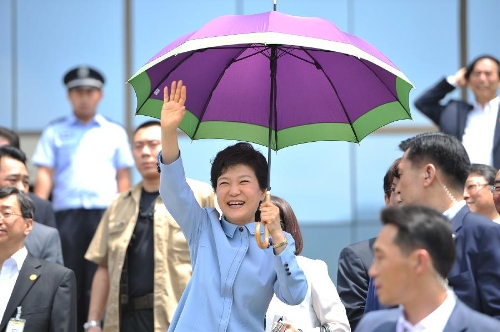President Park's China visit: Promoting better cooperation and coordination?
- By Fan Jishe
 0 Comment(s)
0 Comment(s) Print
Print E-mail China.org.cn, July 1, 2013
E-mail China.org.cn, July 1, 2013
Accompanied by a sizeable delegation, South Korean President Park Geun-hye began her four day state visit to China on June 27. Her visit is expected to further strengthen the relationship between the two countries and to draw "a new blueprint for the common prosperity of Korea and China looking to the next two decades," as Park said during an interview with China Daily on June 26.
|
|
|
Accompanied by a sizeable delegation, South Korean President Park Geun-hye began her four day state visit to China on June 27. [Xinhua] |
China and South Korea have made dramatic progress in their overall relations in the past two decades, especially in their economic relations. Now both sides have pledged in a joint statement to enhance trade and economic cooperation and to push forward on the Free Trade Agreement. The Chinese-Korean economic relationship is very likely to further deepen in the coming years.
However, in the area of regional security and diplomacy, little progress has been made in the past. Chinese-South Korean security relations are complicated by both North Korea's nuclear policy and the South Korean security alliance with the United States. South Korea's policy toward North Korea has undergone lots of changes over the past two decades, and while some of these changes are conducive to a peaceful and diplomatic solution to the North Korean nuclear issue, some are not.
South Korea has generally pursued one of two overarching policies on the issue of North Korea's nuclearization: the Sunshine Policy initiated by former President Kim Dae-jung and followed by former President Roh Moo-hyun, and the "tough love engagement policy" pursued by former President Lee Myung-bak. These two schools of thought have very different implications for South Korea's relationships with North Korea, the United States and China. Undoubtedly, South Korea has much at stake where the stability and denuclearization of the Korean Peninsula are concerned. However, in deciding how to achieve that goal, South Korea has hesitated between unconditional engagement and conditional engagement with North Korea.
President Kim Dae-jung and President Roh Moo-hyun were decisively in favor of unconditional engagement with North Korea and met with North Korea's then-leader Kim Jong-il. Tension on the Korean Peninsula was effectively reduced during their tenures, but progress on denuclearization remained limited. During that time, when South Korea was pursuing an independent foreign policy, relations became strained with the United States, which partly explained the major progress towards reconciliation with North Korea. And although South Korea's policy priority of stability and denuclearization was very much in line with China's, there was, unfortunately, very limited coordination and cooperation between the two countries, which may explain why denuclearization was not achieved during this period. .




 Add your comments...
Add your comments...

